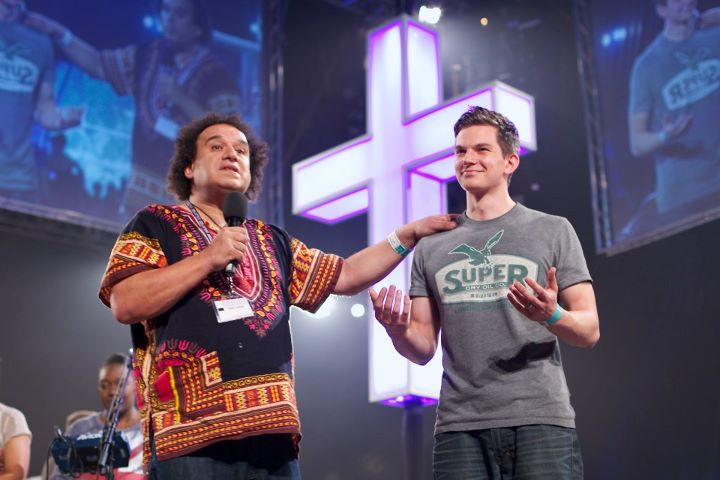Mike Pilavachi: Healing, miracles, and why the supernatural doesn't have to be weird

"If God is God, and he did it in the Scriptures, why would it be weird if he did it today?"
Mike Pilavachi is talking about a respondent to a survey who claimed he saw a lady's leg "grow two inches in a matter of seconds, so it matched the length of her other leg". I'd asked him if that wasn't a bit weird.
The word was suggested by the title of a book the founder of Soul Survivor has written with Andy Croft, entitled Everyday Supernatural: Living a Spirit-Led Life without Being Weird (a title suggested by none other than Matt Redman, he says, who's "good with words"). And while Pilavachi absolutely believes that such examples of miraculous healing are genuine manifestations of the power of God, the book isn't designed to convince sceptics of that. In fact, such examples are out on the far edge of everyday supernatural living.
The idea behind the book, says Pilavachi, is to help the Church to understand that supernatural ministry is "meant to be normal, natural and not weird – to take it away from the platform and the stage and bring it back to the local church and the ordinary Christian".
The book is launched against the backdrop of a survey conducted by Christian Research revealing some surprising findings. Two out of three Christians say they've had a personal experience of the supernatural, and more than half of these said it happened within the past year – one in four within the past week.

As well as spectacular healing miracles, though, respondents also spoke of a feeling of God's presence during prayer, at communion or mass. Several respondents reported being visited by angels. The great majority of experiences involved answered prayer and healing.
But then two in every three (68 per cent) feel that any over-emphasis on 'miracles' may give Christians a bad name – a view more strongly held by older people.
Speaking to Christian Today, Pilavachi confesses himself surprised by the number who've had supernatural experiences, but admits he shouldn't be. He cites the Acts of the Apostles, in which the supernatural was routine, and says it should be a normal part of the Christian life today.
But what exactly is the supernatural? He says: "We define it in the book as God's intervention in our lives. Every single time someone becomes a Christian, it's a supernatural act. We want to define it as seeing God moving in the everyday. It's not what happens at huge events and meetings."
In the book, he says, "We talk about what it means to manifest the presence of the Spirit and minister in the power of the Spirit, the gift of prophecy, the place of obedience as the highest form of worship. We tell stories of what we have seen and heard the Lord do."
He places their work on a spectrum. At one end are charismatic/Pentecostals, whose meetings might go on for hours and hours and are characterised by laughter and people falling over. "But no one ever becomes a Christian," he says – they've left long before the meetings are finished.
At the other extreme there are traditionally conservative churches which see the charismatic extremes and hate the hype – his word – and think, "We're not going anywhere near it." That, Pilavachi says, is to "put God in a box, where we are in control, and we won't let anything happen".
There has to be a middle way, he says, adding: "It's messy in the nursery, and neat and tidy in a graveyard."
He gives the example of Christians being willing to open themselves to receive, and being courageous enough to relay words of knowledge from God, unique insights into the life and situation of another person that could only be supernatural in origin. Step out in faith, he says: "If you get it wrong, nobody dies. It might hurt your pride, but that's not a terrible thing.
"We want to encourage the whole Church. I hope leaders who believe in theory will start to move in practice."
Pilavachi gives a startling and recent example. Sam, a friend of 20 years who belongs to Tim Hughes' Gas Street Church in Birmingham, was walking through a city park in June when he saw a man sitting on a bench. He felt God was telling him the man's name – Daniel – and that he should go and tell him he believed he was in prison, but that God could free him. After an initial hostile reaction, the man broke down and admitted he had been contemplating suicide. He's now regularly attending the church and has testified to the truth of his story with Sam.
But, Pilavachi says: "It doesn't have to be as huge a story as that." He's anxious to move the discourse from an emphasis on feelings to something more pragmatic: this is how God expects us to live in the everyday.
And the project involves more than a book. Next year there's a conference planned at the Stafford Showground from July 22-27, Naturally Supernatural 2017, badged as "a brand new event aimed at anyone who wants to move in the ministry and the power of the Holy Spirit". There will be two main meetings a day, with practical workshops, social events and a full children's programme.
"It's about demythologising the supernatural and making it accessible," Pilavachi says.
Everyday Supernatural: Living a Spirit-Led Life without Being Weird by Mike Pilavachi and Andy Croft is published by David C Cook, £9.99.
Follow Mark Woods on Twitter: @RevMarkWoods











